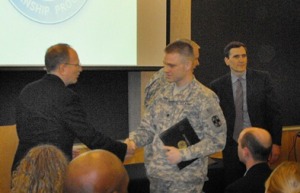First biomeds graduate from GE, Army Reserve program
by
Brendon Nafziger, DOTmed News Associate Editor | March 26, 2012

Spc. Wayne Reger receives
his certificate (Credit: GE)
A U.S. Army Reserve command responsible for West Coast medical deployments and GE Healthcare said they've graduated the first class from their jointly run program to expand the ranks of hirable field engineers and biomedical technicians.
On March 15, seven Army Reservists became the first wave to pass from the year-long "externship" program, which taught the soldiers how to repair and maintain medical equipment to make them more useful for the military, and also to give them skills to get biomed jobs in civilian life. Already, almost half of this first small graduating class was hired by GE.
Medical command
For the program, GE is collaborating with the 807th Medical Command, which oversees Army Reserve medical repair deployments in the western United States, and is stationed at Fort Douglas in Salt Lake City.
The command has about 233 medical technicians. But when the program started, the 807th had been having staffing problems. "Currently, the 807th Medical Command has only enough assigned soldiers to fill just over half of its authorized positions for enlisted soldiers," the command said in its magazine, The Pulse, last year. "The manning of biomedical equipment warrant officers is even worse, with only 31 percent of authorizations currently assigned."
Of course, this is where the program comes in -- getting more trained soldiers able to do the difficult, technical work of equipment repair. "The benefit to the Army Reserve is these guys are more ready to handle deployment when they're called to duty," Nate Bailey, senior HR manager for GE Healthcare, explained to DOTmed News.
How the program works
The seven participants who graduated last week were all first chosen by the Army Reserve and brought on active duty for their training. "It's essentially like being deployed, except you're deployed to GE, and it's a skill-building deployment," Bailey said.
For the 12-month program, the reservists spent the first three months at the "school house," as the Army Reserve's medical training facility in San Antonio, Texas is known. There, they worked towards the Reserve's requirements and underwent GE's compliance training.
For the next nine months, the "externs" went back to their homes or their bases, where they partnered with working certified GE technicians to learn on the job -- hence the name of their role, "extern."
"During the day, Monday through Friday, they're working side by side with our employees," Bailey said.
The class was split into two separate segments: biomedical technicians, those who work on smaller, movable devices like IV pumps and heart monitors; and field engineers, who do on-site repairs of "big iron," such as CT and MRI scanners. In the program, the biomeds were assigned to hospitals, while the field engineers were given a defined territory to work in, where they were supervised by a fully certified GE technician. The locations were all generally west of Ohio, as the western states fall under the jurisdiction of the 807th Medical Command, Bailey said.
Twice during the nine-month "hands on" portion of the program, the externs were invited to GE's training headquarters in Waukesha, Wisc., just outside Milwaukee.
Training and staffing
The benefit to the Army Reserve is having soldiers better trained for deployments. And the benefit to GE is similar: new staff. Of the seven externs who graduated last week, three have subsequently been hired by GE, Bailey said.
A second wave is running now, and a third will start soon, GE said. Each has seven participants, and Bailey said he hopes to have had almost 30 enrolled by the end of the year.
"It's a nice partnership. How long will it continue? As long as it's beneficial to both parties," Bailey said. "We don't have any plans to close it out."
GE's U.S. service business, where Bailey works, has about 2,400 field engineers and 900 biomedical technicians, he said. About 20 percent of the workforce are veterans or in the reserves.
|
|
|
You Must Be Logged In To Post A Comment
|
